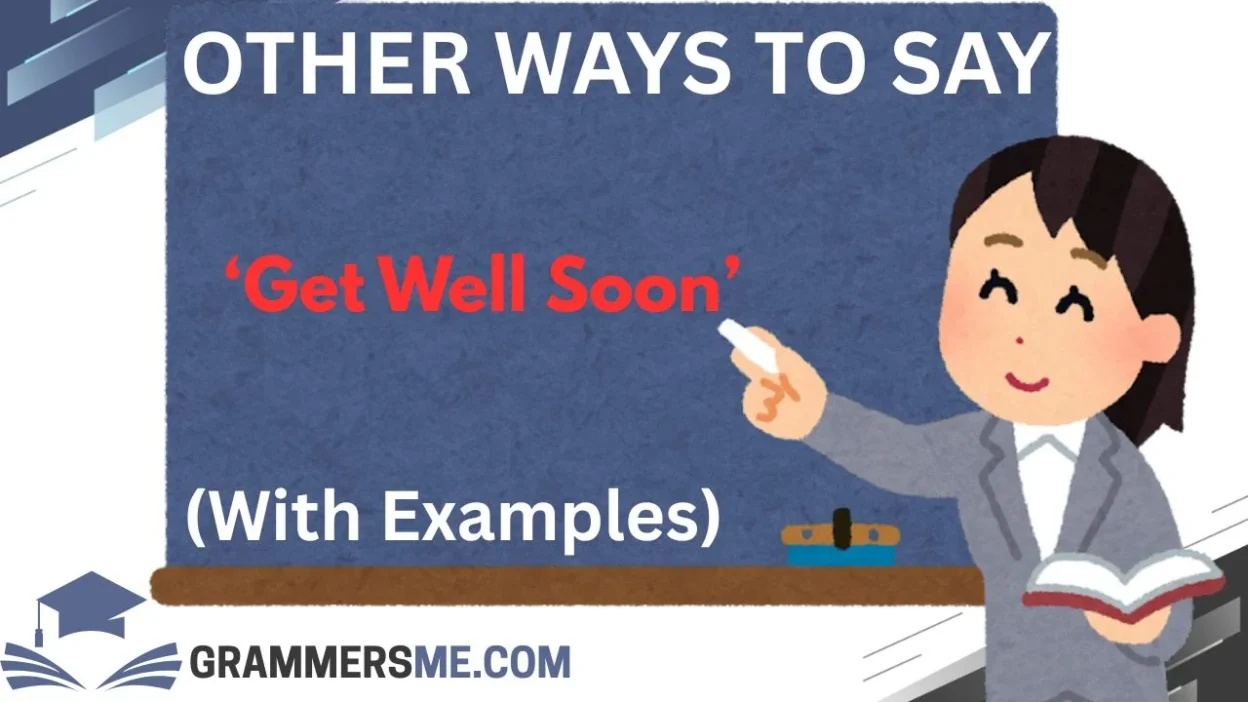When someone we care about is unwell, offering support with thoughtful words can make a world of difference. While saying “Get well soon” is always a nice gesture, there are many other ways to convey your concern, care, and best wishes. The right words can uplift someone’s spirits, remind them they’re not alone, and help speed up the recovery process.
Sometimes, switching up the wording can feel more personal, making your message feel even more meaningful and genuine. Below, you’ll find 30 alternative ways to say “Get well soon,” complete with detailed meanings, examples, and the best scenarios to use them. Whether you’re looking for something more casual or formal, we’ve got you covered.
What Does “Get Well Soon” Mean?
“Get well soon” is a simple, universally recognized expression of sympathy and encouragement. It’s used to wish someone a quick recovery when they’re sick or going through a tough time health-wise. The phrase communicates care and hope for the person’s wellbeing, showing that you’re thinking about them and wishing them strength.
Though the phrase is often used to comfort, it may sound generic at times. That’s why exploring alternatives can provide a more thoughtful and specific way of expressing your sentiments.
Is It Professional/Polite to Say “Get Well Soon”?
In professional settings, using “Get well soon” is generally accepted as polite, especially if it’s directed toward a colleague or boss. However, depending on the context, you might prefer a slightly more formal or professional phrase. This is particularly important if you’re in a workplace environment where casual expressions might not feel appropriate. On the other hand, in a close-knit team or with someone you know personally, “Get well soon” can be a warm and comforting gesture.
1. Wishing You a Speedy Recovery
Meaning: Hoping for a fast return to good health.
Explanation: A more detailed way to express the same sentiment as “get well soon.”
Scenario Example: A friend who’s recovering from surgery or a minor illness.
Best Use: For those looking for a slightly more formal but still caring expression.
Not Use: For someone going through a serious illness where a gentler tone might be more appropriate.
2. Hope You Feel Better Soon
Meaning: A gentle wish for someone’s recovery.
Explanation: It implies that the person isn’t feeling their best but expresses optimism for their improvement.
Scenario Example: When a colleague is out sick but you’re not sure about the severity of their illness.
Best Use: In casual or professional settings.
Not Use: For a more serious or long-term illness where something more comforting might be needed.
3. Take Care and Get Well Soon
Meaning: A wish for someone to prioritize their health and recover quickly.
Explanation: Adds an element of self-care alongside the wish for recovery.
Scenario Example: When you’re telling a friend or family member to rest and recover well.
Best Use: In personal and semi-formal messages.
Not Use: In very formal work communications.
4. Get Well Quickly
Meaning: A direct wish for rapid recovery.
Explanation: Short and to the point, this phrase conveys a sense of urgency for recovery.
Scenario Example: When you’re close to someone and want them to feel better right away.
Best Use: For informal settings with close friends or family.
Not Use: In formal or distant professional relationships.
5. Hoping for Your Swift Recovery
Meaning: Expressing a desire for a fast and smooth recovery.
Explanation: A more elegant and slightly formal way to wish someone well.
Scenario Example: A colleague who’s been out sick for a while.
Best Use: For professional or formal situations.
Not Use: For very casual or informal conversations.
6. Wishing You Strength and Health
Meaning: A wish for physical and emotional strength during recovery.
Explanation: A more holistic wish, focusing on both physical and emotional well-being.
Scenario Example: When someone is going through a difficult illness or emotional recovery.
Best Use: For deeper connections, such as close friends or family members.
Not Use: When the illness is minor or doesn’t require much emotional support.
7. I Hope You’re Back on Your Feet Soon
Meaning: Wishing someone to regain their strength and mobility.
Explanation: Implies a return to normal activities and wellness.
Scenario Example: When a friend is recovering from an injury or surgery.
Best Use: For a casual, friendly tone.
Not Use: When someone is dealing with a chronic illness or long-term health issues.
8. Wishing You a Restful Recovery
Meaning: Hoping someone takes the time to rest and heal properly.
Explanation: Encourages rest as part of the healing process.
Scenario Example: When someone needs to take it easy and rest while recovering.
Best Use: For those recovering from surgery or a debilitating illness.
Not Use: For someone whose recovery isn’t related to physical exhaustion.
9. Take It Easy and Feel Better Soon
Meaning: Encourages someone to rest and recover at their own pace.
Explanation: A more laid-back, gentle wish for recovery.
Scenario Example: A colleague who’s taken a day off due to illness.
Best Use: For light, informal, and caring messages.
Not Use: When addressing a serious illness requiring more serious and formal words.
10. Get Well and Take Care of Yourself
Meaning: A caring and considerate message that emphasizes self-care.
Explanation: Reminds the person to prioritize their well-being while they recover.
Scenario Example: A friend or loved one who’s going through a tough time.
Best Use: For close friends or family.
Not Use: In formal or professional settings.
11. I Hope You’re Back to Feeling Your Best Soon
Meaning: Wishing someone to return to their normal state of health and energy.
Explanation: This phrase emphasizes the person returning to their usual, healthy self.
Scenario Example: When a friend is recovering from an illness that has temporarily made them feel off.
Best Use: Casual, personal settings with friends or family.
Not Use: For someone dealing with a chronic condition or long-term recovery.
12. Wishing You a Quick and Smooth Recovery
Meaning: A wish for a recovery that’s both fast and free from complications.
Explanation: This phrase conveys a desire for both speed and ease in the recovery process.
Scenario Example: A family member recovering from a surgery or treatment.
Best Use: In both formal and informal contexts.
Not Use: For very minor illnesses or casual recovery periods.
13. Take Care of Yourself and Rest Up
Meaning: Encouraging someone to focus on taking care of themselves and resting.
Explanation: A caring phrase that reminds the person to rest and heal.
Scenario Example: When someone is recovering from a cold or flu.
Best Use: Informal settings with friends or family.
Not Use: In professional or very formal messages.
14. I’m Thinking of You and Hoping for Your Recovery
Meaning: A message of emotional support while wishing for recovery.
Explanation: This phrase highlights the emotional connection, alongside the wish for health.
Scenario Example: When a friend is going through both a physical and emotional healing process.
Best Use: Close friends and family, or people you are emotionally close to.
Not Use: In casual or business contexts where emotional support is less fitting.
15. Wishing You a Restful and Peaceful Recovery
Meaning: Hoping the person finds comfort and relaxation during their recovery.
Explanation: A wish not just for physical health, but also for emotional tranquility.
Scenario Example: For someone recovering from a stressful illness or surgery.
Best Use: For someone who needs emotional comfort and peace during recovery.
Not Use: When the recovery process is fast or minor, and peace isn’t the primary concern.
16. Hope You’re Feeling Better Each Day
Meaning: Wishing for gradual improvement and healing.
Explanation: This phrase expresses hope for steady, day-by-day recovery.
Scenario Example: A friend or colleague who’s been ill for a few days.
Best Use: For illnesses that take time but show gradual improvement.
Not Use: For severe illnesses or situations where quick recovery is expected.
17. Wishing You Good Health and Happiness
Meaning: A broader wish for both physical health and overall wellbeing.
Explanation: A more encompassing phrase that wishes for long-term health and emotional happiness.
Scenario Example: When someone is recovering from a long-term illness or just needing some encouragement.
Best Use: For both personal and professional relationships, as it’s a more universal wish.
Not Use: When the focus needs to be strictly on physical recovery.
18. Take Care and Get Better Soon
Meaning: A simple, yet caring message of good wishes.
Explanation: This phrase combines concern for the person’s health and a reminder to take care of themselves.
Scenario Example: A colleague who’s taking time off due to illness.
Best Use: Casual and friendly, ideal for acquaintances and colleagues.
Not Use: In overly formal or distant relationships.
19. Wishing You Comfort and Healing
Meaning: A wish for both physical and emotional healing.
Explanation: This phrase combines physical recovery with emotional comfort.
Scenario Example: A loved one going through both a medical condition and emotional stress.
Best Use: For those who are dealing with a tough situation, physically and emotionally.
Not Use: For someone with a quick or simple recovery process.
20. Hope You Feel Stronger Every Day
Meaning: Wishing someone to feel better and more resilient with each passing day.
Explanation: A phrase focused on gaining strength during recovery.
Scenario Example: A person recovering from a serious illness or surgery.
Best Use: For individuals undergoing significant recovery efforts.
Not Use: For minor illnesses that don’t require much strength to overcome.
21. Wishing You Peace and Good Health
Meaning: A holistic wish that combines emotional peace with physical health.
Explanation: Focuses on both mind and body in the recovery process.
Scenario Example: When someone is recovering from a stressful or mentally taxing illness.
Best Use: For loved ones or those you’re close to emotionally.
Not Use: For casual acquaintances where a more neutral expression is appropriate.
22. May Your Recovery Be Quick and Smooth
Meaning: A wish for a recovery free from complications and delays.
Explanation: Implies that not only speed but also ease is desired for the person’s recovery.
Scenario Example: When someone is going through a surgery or minor procedure.
Best Use: In both formal and informal settings where a polite, encouraging tone is needed.
Not Use: When the recovery may take longer or be more complicated.
23. Wishing You Restful Days Ahead
Meaning: A wish for time to recover and rejuvenate.
Explanation: Focuses on encouraging rest as an important part of recovery.
Scenario Example: A person who’s taking time off to recover from an illness.
Best Use: For someone who needs rest and time to heal.
Not Use: In professional contexts where a more formal message is required.
24. Sending Healing Thoughts Your Way
Meaning: Offering emotional and mental support in the form of positive thoughts.
Explanation: This phrase shows that you’re thinking of the person’s healing process.
Scenario Example: When a friend is recovering from surgery or a serious illness.
Best Use: For friends, family, or anyone going through a lengthy recovery.
Not Use: For very short-term illnesses or professional messages.
25. Wishing You a Full and Complete Recovery
Meaning: Hoping for a recovery that brings someone back to their full strength and health.
Explanation: A more comprehensive way to wish someone well, indicating you hope they come back better than ever.
Scenario Example: When someone is recovering from a serious health issue or procedure.
Best Use: For serious illnesses or conditions requiring a full recovery.
Not Use: For minor illnesses or short-term issues.
26. Hope You’re Back to Your Old Self Soon
Meaning: A desire for someone to feel normal again soon.
Explanation: Implies that the person is temporarily not themselves due to illness or injury.
Scenario Example: When a friend or colleague is struggling with a cold or fatigue.
Best Use: Casual, friendly settings.
Not Use: For situations where the illness is more serious and long-lasting.
27. Wishing You Rest and Rejuvenation
Meaning: Hoping for not only recovery but also a sense of renewal during the recovery process.
Explanation: Encourages the person to take time for healing and self-care.
Scenario Example: When someone is emotionally or physically drained from illness or stress.
Best Use: For those who need a gentle push to take care of themselves.
Not Use: In professional contexts where a more direct or formal message is needed.
28. Take Your Time to Recover – We’ll Be Waiting for You!
Meaning: A supportive and reassuring message that conveys patience.
Explanation: This phrase emphasizes that recovery is more important than rushing back to normal life.
Scenario Example: A colleague or friend who has taken extended leave to recover.
Best Use: In supportive, encouraging messages to show patience during a long recovery.
Not Use: For a quick or minor recovery where no extended time off is needed.
29. Get Well, Stay Strong, and Know You’re Loved
Meaning: A wish for both health and emotional strength.
Explanation: A more heartfelt message that expresses both recovery and support.
Scenario Example: For a close friend or family member who is battling illness.
Best Use: For close, personal relationships where emotional support is key.
Not Use: In formal or distant professional settings.
30. Hope You’re Back to Health in No Time
Meaning: Wishing for a very fast return to health.
Explanation: A quick, positive wish for speedy recovery.
Scenario Example: For a friend or colleague who’s missing work due to illness.
Best Use: Casual, light-hearted settings.
Not Use: For situations where the illness may take longer or is more serious.
Conclusion
The language we use to wish someone well during their recovery can have a profound effect on their spirits. Each of these 30 alternative ways to say “Get well soon” offers a unique approach that can make your message feel more personal, thoughtful, and impactful. By considering the tone, relationship, and specific situation of the person you’re addressing, you can select the perfect message to express care and support.
Frequently Asked Questions
1. How do I choose the right alternative to “Get well soon”?
The best choice depends on your relationship with the person and the severity of their illness. For close friends or family, more heartfelt and personalized messages are ideal, while more formal phrases work better for acquaintances or professional settings.
2. Can I use these alternatives in emails or cards?
Yes! These alternatives are great for emails, greeting cards, or text messages. Just make sure to tailor your message to the situation.
3. What if the person’s recovery is expected to take a long time?
For long-term recoveries, focus on messages that are encouraging and supportive. Phrases like “Wishing you strength and healing” or “I’m thinking of you during this time” can offer comfort.
4. Can these alternatives be used for emotional recovery as well?
Definitely! Many of these alternatives can work for emotional recovery as well, especially those that focus on healing, peace, and strength.
5. Should I include personal touches in my message?
Personal touches are always appreciated. If you know the person’s specific needs or preferences, incorporating that into your message can make it even more meaningful.




